- Why Us?
- Features
White Label
For SaaS Platforms & Agencies
Provide our complete analytics suite to your clients, directly within your own interface and with your/their own branding. Discover Analytics-as-a-Service and White Label Analytics. Great benefit, minimal effort.
- Pricing
- White Label
- Success Stories
- ResourcesGetting Started
CONTENTS
- Types of Case Studies in Marketing
- 1. UNIQLO's "Uncover"
- 2. Airbnb's "Made Possible by Hosts"
- 3. Canva's "What Will You Design Today?"
- 4. Dove's Influencer Community
- 5. Tuft & Needle's Personalization
- 6. Dollar Shave Club's Viral Videos
- 7. Nike's "Dream Crazy"
- About the Company
- 8. Aerie's "Aerie Real"
- 9. Apple's "Shot on iPhone"
- Strategy and Execution
- 10.Baby Planet's Careful Partner Curation
- 11. Dunkin Donuts
- 12. Roomify
- 13. RxBAR, Spotify, and Ice-T
- 14. NIVEA's "Men DEEP"
- 15. GumGum
- 16. LOCALIQ
How These 16 Marketing Case Studies Changed the Game

We can all learn something from the successes of others and in this blog, you'll find 16 examples of famous campaigns that together cover all the different marketing approaches available to companies.
From a mobile marketing campaign that turned RxBAR from startup to multi-million dollar business in under five years, to GumGum's bespoke comic book for an account-based marketing target whose CEO is obsessed with Batman, each case study reveals the tactics that work best for specific goals, audiences, and platforms.
Whether you're a B2B marketer, SEO strategist, or looking to enter another international market, these case studies offer practical lessons to help you optimize your own marketing efforts, no matter your industry.
Types of Case Studies in Marketing
Marketing is an ever-evolving field of intersecting digital channels, and using them to achieve business goals requires almost as many strategies.
Each one requires a unique approach, tools, and tactics if brands are to engage their target audiences and drive results.
Below is a list of all the different types of case studies available to marketers, with definitions. Click on each, and you'll jump down to the best example we know of the approach in action:
- Digital Marketing: Exploring the integration of online channels to achieve overarching goals.
- Social Media Marketing: Engaging audiences on platforms like Instagram and Facebook to build brand awareness.
- B2B Marketing: Focusing on relationship-building and targeted outreach to other businesses.
- Influencer Marketing: Leveraging popular personalities to create authentic connections with consumers.
- Email Marketing: Utilizing personalized communication to nurture leads and retain customers.
- YouTube Marketing: Creating compelling video content to engage potential customers and drive engagement.
- Video Marketing: Using video content across various platforms to enhance engagement and brand visibility.
- eCommerce Marketing: Driving traffic and increasing sales for online retailers through targeted strategies.
- Integrated Marketing Campaigns: Unifying messaging across digital and traditional channels for a cohesive brand experience.
- Affiliate Marketing: Partnering with affiliates to boost traffic and sales through performance-based marketing.
- International Marketing: Navigating global markets with tailored strategies to reach diverse audiences.
- Amazon Marketing Strategy: Optimizing listings and leveraging tools within Amazon’s marketplace for increased sales.
- Mobile Marketing: Engaging customers through mobile devices for maximum interaction and reach.
- E-Sport Marketing: Tapping into competitive gaming to connect with a passionate audience.
- Account-Based Marketing: Focusing on high-value accounts to drive tailored marketing efforts.
- Search Engine Marketing: Utilizing paid advertising on search engines to enhance visibility and generate leads.
Each of these case studies provides valuable insights into the effectiveness of specific marketing strategies and serves as a guide for businesses looking to optimize their marketing efforts.
1. UNIQLO's "Uncover"
→ Digital Marketing Case Study
About the Company
UNIQLO is a Japanese clothing brand with over 1,000 stores worldwide. The company is known for their LifeWear philosophy, which aims to provide high-quality, affordable everyday clothing.
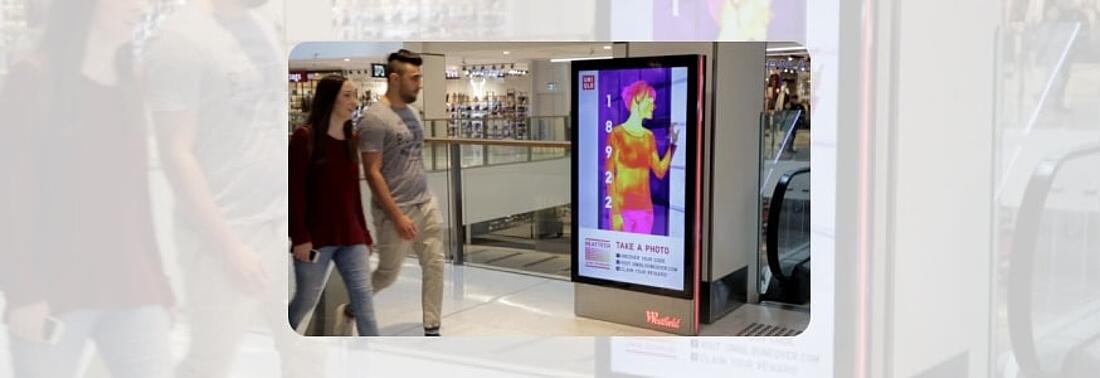
Strategy and Execution
UNIQLO launched a creative campaign called "Uncover", which featured digital billboards in 100 locations across Australia, as well as online. They displayed rapidly changing images that revealed a unique product code invisible to the naked eye.
These billboards, placed in high-traffic areas, showcased visuals at 20-30 frames per second, prompting consumers to capture the code by photographing the display.
Participants uploaded the five-digit code on the campaign site to claim a sample from the HEATTECH clothing range. The site guided them through the benefits of each product and led them to a winning page where they could receive a sample T-shirt or discount voucher.
The experience was designed to be easily shareable on social media, encouraging users to involve their friends through related YouTube and Facebook videos.
Campaign Success → Marketing Numbers
The campaign achieved impressive results, with online videos garnering 1.3 million views and over 25,000 new subscribers to UNIQLO's newsletters. Overall, the initiative reached more than four million people, resulting in 35,000 new customers.
The campaign's success makes it a great digital marketing case study that businesses can emulate.
2. Airbnb's "Made Possible by Hosts"
→ Social Media Marketing Case Study
About the Company
Airbnb is a popular online marketplace for short and long-term rentals, connecting travelers with accommodation. Founded in 2008, they have since become a household name in travel and lodging.
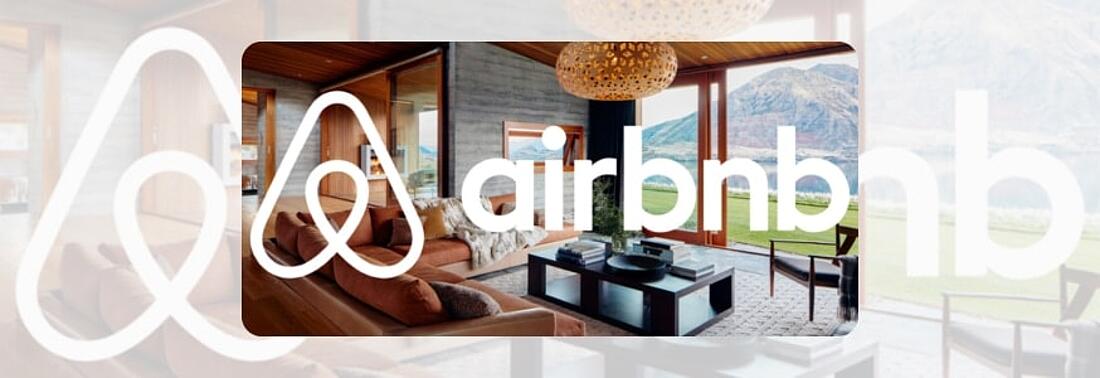
Strategy and Execution
In February 2021, Airbnb launched the "Made Possible by Hosts" campaign to strengthen its community of hosts and highlight the positive impact they create by welcoming travelers into their homes.
This initiative marked Airbnb's first investment in TV advertising in five years, underscoring the brand's commitment to host appreciation.
The campaign employed a mix of promotional channels, including primetime television, to reach a diverse audience. By emphasizing the invaluable contributions of hosts, Airbnb not only expressed gratitude but also reinforced its dedication to building a vibrant community.
Campaign Success → Marketing Numbers
Airbnb’s campaign garnered 17 million views across social media platforms, effectively showcasing the positive impact of Airbnb’s host community. Additionally, this marked Airbnb’s reentry into TV advertising, expanding reach and visibility across multiple channels.
The campaign serves as an exemplary social media marketing case study, highlighting how appreciation can foster brand loyalty among travelers and hosts alike.
3. Canva's "What Will You Design Today?"
→ B2B Marketing Case Study
About the Company
Canva is a design platform that people can use to create a wide array of visual content, and it's become the go-to tool for online design and publishing since it arrived on the scene in 2013.
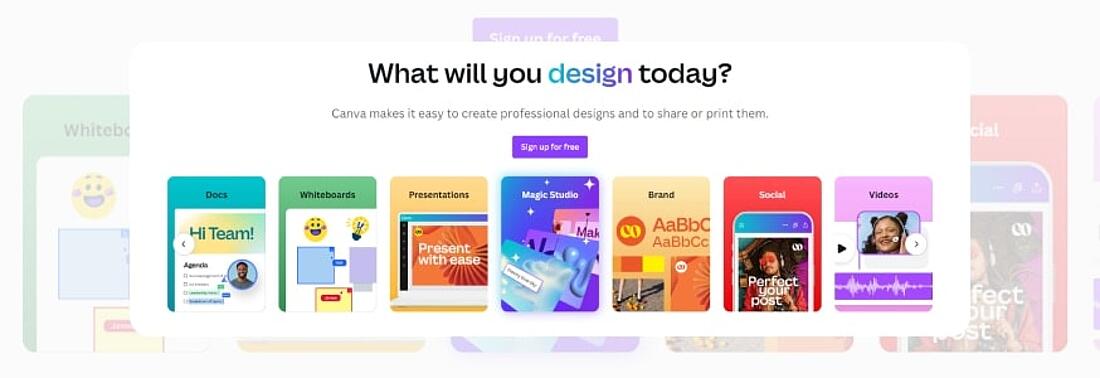
Strategy and Execution
The “What Will You Design Today?” campaign aimed to showcase Canva's versatility and intuitive interface, inspiring users to unleash their creativity.
Leveraging user-generated content, the campaign highlighted Canva's broad design capabilities - from social media graphics and presentations to marketing materials - underscoring its appeal for both personal and professional use.
With a blend of social media, email marketing, and video content, Canva reached a diverse audience, motivating users to explore what they could design.
This strategy emphasized Canva's mission of making design accessible and fostered a community of creators inspired by each other’s work.
Campaign Success → Marketing Numbers
The 2022 “What Will You Design Today?” campaign marked Canva’s first B2B initiative, achieving impressive results with 98 million hits.
This reach showcased Canva's relevance to business users and positioned it as an essential tool for companies looking to equip their teams with simple, powerful design capabilities.
The campaign’s success makes it a standout B2B marketing case study, exemplifying how Canva has expanded its impact within the business sector.
4. Dove's Influencer Community
→ Influencer Marketing Case Study
About the Company
Dove is a provider of body, hair, and skincare products, and operates in over 150 countries. They're commited to promoting real beauty standards and fostering self-esteem among people from all background.
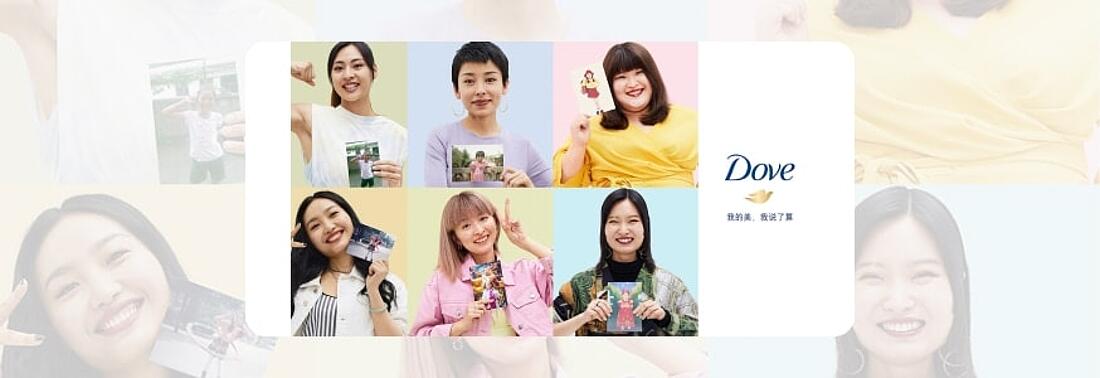
Strategy and Execution
Dove aimed to foster inclusivity and redefine beauty standards through impactful campaigns like #PassTheCrown, #DetoxYourFeed, and #TurnYourBack.
The brand harnessed the voices of micro-influencers to spark authentic discussions around self-esteem and representation, showing that relatable, smaller influencers can drive meaningful engagement.
For example, Baby Dove’s #OneRealPressure encouraged new mothers to share genuine postpartum stories, while #TurnYourBack, featuring Gabrielle Union, challenged toxic beauty ideals, building a supportive community aligned with Dove’s mission.
Campaign Success → Marketing Numbers
In 2022, Dove's influencer campaigns generated over 1 billion impressions and saw a 20% rise in social media engagement.
The #TurnYourBack campaign alone gained 54 million video views and 567,000 engagements, with extensive media coverage in Women’s Health, WWD, and PopSugar.
By effectively leveraging micro-influencers, Dove’s initiatives became an inspiring influencer marketing case study, earning accolades like a Shorty Award and the Media Grand Prix at Cannes Lions 2023.
5. Tuft & Needle's Personalization
→ Email Marketing Case Study
About the Company
Tuft & Needle, an innovative American mattress-in-a-box company founded in 2012, has since gained recognition for their direct-to-consumer approach and high-quality sleep products.
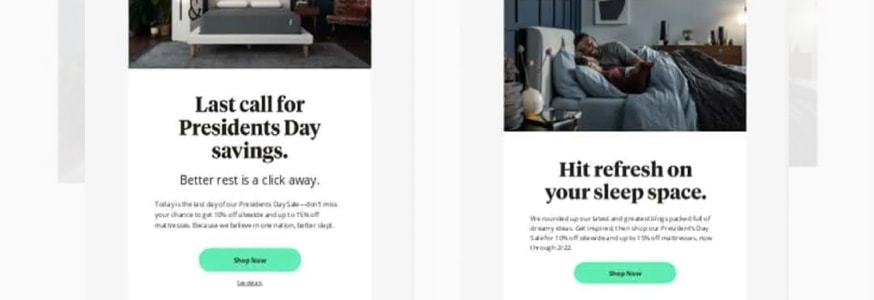
Strategy and Execution
Tuft & Needle’s email marketing centers on personalization, using customer data to create content that directly aligns with individual interests and needs.
Their approach to cart abandonment emails - a key eCommerce KPI - is lighthearted and engaging, featuring fun illustrations and friendly copy that gently prompts users back to their site without being pushy.
Transparent messaging combined with subtle calls to action creates a welcoming feel, encouraging customers to re-engage naturally.
Campaign Success → Marketing Numbers
This personalized, customer-focused strategy has driven a 181% revenue increase from email marketing, solidifying Tuft & Needle’s campaigns as a compelling email marketing case study for brands seeking to convert interest into sales effectively.
About the Company
Dollar Shave Club, founded in California in 2011, provides affordable razors and a range of men's grooming products through a convenient direct-to-consumer subscription model.
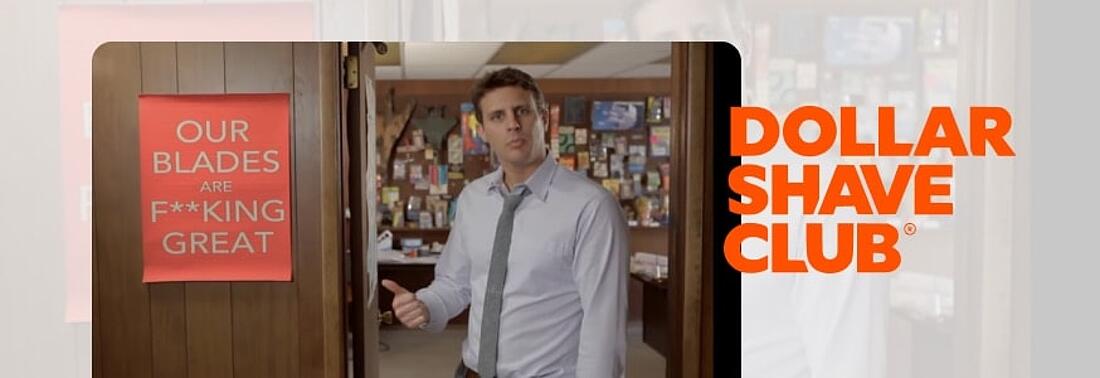
Strategy and Execution
Dollar Shave Club’s viral debut, “Our Blades Are F****ing Great,” brilliantly used humor and simplicity to cut through the noise of traditional razor advertising.
Released in 2012, the video starred founder Michael Dubin, whose deadpan delivery highlighted the absurdity of overpriced, feature-heavy razors.
With straightforward humor, the ad redefined the category’s messaging, positioning Dollar Shave Club as an affordable alternative without the excess.
Campaign Success → Marketing Numbers
The video’s relatable approach quickly gained traction, reaching nearly 28 million views by 2022, driving unprecedented brand awareness and culminating in Unilever’s $1 billion acquisition of Dollar Shave Club in 2016.
This YouTube marketing case study exemplifies how a clever message and authentic voice can build a brand that redefines an industry.
7. Nike's "Dream Crazy"
→ Video Marketing Case Study
About the Company
Nike, a leading American corporation specializing in athletic footwear, apparel, and sports equipment, stands as the world’s largest supplier of athletic shoes and related products.

Strategy and Execution
Nike’s 2018 “Dream Crazy” campaign, led by Colin Kaepernick, redefined brand advertising by focusing on social justice and resilience over product promotion.
The campaign urged viewers to pursue their dreams despite challenges, portraying Nike as a supporter of trailblazers and advocates for social change.
Featuring iconic athletes like Serena Williams and LeBron James, “Dream Crazy” highlighted individuals who overcame barriers, with Kaepernick’s message underscoring the idea to “believe in something, even if it means sacrificing everything,” which drew widespread attention and polarized public response.
Campaign Success → Marketing Numbers
The ad’s daring stance generated over 80 million views in its initial days, boosted Nike’s online sales by 31%, and earned multiple awards, including an Emmy.
This powerful video marketing case study demonstrates how purpose-driven campaigns can resonate deeply, fostering brand loyalty and appealing to socially aware audiences.
8. Aerie's "Aerie Real"
→ E-commerce Marketing Case Study
About the Company
Aerie, a popular women’s lifestyle brand under the umbrella of American Eagle Outfitters, offers a diverse range of intimate apparel, activewear, loungewear, and other fashionable essentials for women.
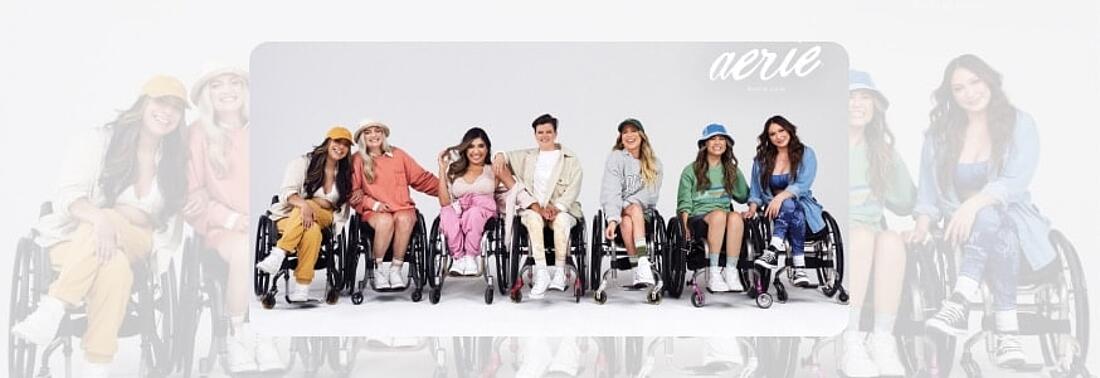
Strategy and Execution
Launched in 2014, Aerie’s “Aerie Real” campaign challenged fashion industry norms by eliminating retouching in its ads, choosing instead to celebrate natural beauty and diverse body types.
Featuring models of various shapes, sizes, and ethnicities, Aerie built a body-positive brand image that emphasizes self-confidence and inclusivity.
This approach resonated with young women, positioning Aerie as a brand that values authenticity and empowers its audience, while setting a new benchmark for transparency in fashion marketing.
Campaign Success → Marketing Numbers
“Aerie Real” quickly gained traction, resulting in a 20% sales increase within its first year and continued growth since.
The campaign’s message received extensive media coverage and high engagement on social media, helping to solidify Aerie’s brand loyalty and foster a community around body positivity.
This eCommerce marketing case study shows that prioritizing authenticity and aligning with consumer values can drive substantial sales and brand growth over time.
9. Apple's "Shot on iPhone"
→ Integrated Marketing Case Study
About the Company
Apple, a global leader in consumer electronics, is widely renowned for designing and manufacturing innovative products like the iPhone, Mac, iPad, and Apple Watch that enhance everyday life.

Strategy and Execution
Apple’s 2015 “Shot on iPhone” campaign highlighted the iPhone’s photography capabilities by featuring real photos and videos taken by users.
This user-generated content strategy invited customers to share their work with the hashtag #ShotoniPhone, creating a wave of engaging content. Apple combined social media with traditional ads, displaying striking visuals across billboards, print ads, and TV spots.
By featuring authentic perspectives from diverse users, Apple reinforced the iPhone’s role as a tool for creativity and self-expression.
Campaign Success → Marketing Numbers
The “Shot on iPhone” campaign generated over 1.8 million Instagram posts and extensive social media buzz, contributing to a 50% boost in iPhone sales shortly after its launch.
Winning multiple awards for its innovative approach, the campaign built brand loyalty and created a strong community of users inspired to share their unique stories - solidifying it as an exemplary integrated marketing campaign case study.
10.Baby Planet's Careful Partner Curation
→ Affiliate Marketing Case Study
About the Company
Baby Planet is one of the largest independent nursery retailers in the UK. The company has four physical stores, and a successful eCommerce site from which they sell a wide range of nursery products.
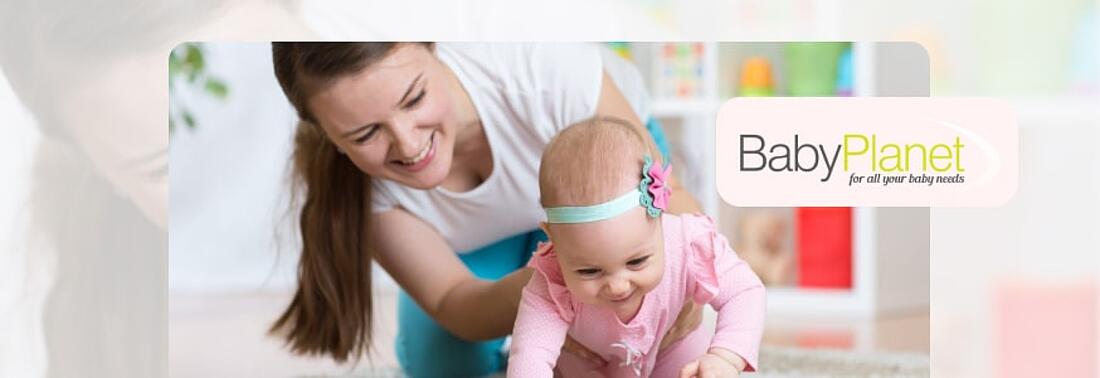
Strategy and Execution
Baby Planet hired Glass Digital to manage their affiliate marketing strategy, which centered around offering attractive discounts through carefully selected partners, including healthcare, discount, and charity affiliates.
Community sites like hotukdeals played a significant role, as Baby Planet strategically undercut competitors, generating significant upvotes from users eager for the best deals.
This approach effectively drove conversions despite the high standards set by the community. Glass Digital also partnered with health-focused affiliates like Blue Light Card, which serves healthcare and emergency workers, allowing Baby Planet to support a cause they value while maintaining healthy margins.
Campaign Success → Marketing Numbers
In 2022, the campaign achieved remarkable results, including a 52.3% increase in traffic, an ROI of 1,029%, and a conversion rate of 4.82%.
Notably, Baby Planet maintained these strong results post-pandemic, a time when many in eCommerce struggled, showcasing the effectiveness of this affiliate marketing case study and targeted affiliate marketing strategy.
11. Dunkin Donuts
→ International Marketing Case Study
About the Company
Dunkin’ Donuts, globally recognized for their coffee and baked goods, offers a variety of donuts, beverages, and breakfast items at 12,900 locations in 42 countries around the world.
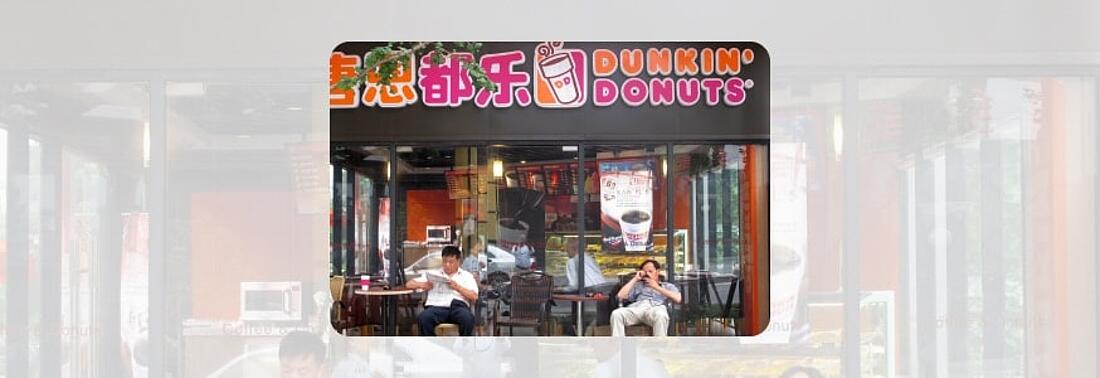
Strategy and Execution
Dunkin’ Donuts takes a localized approach to marketing, adapting its menu to suit regional tastes and cultural preferences across different countries.
Understanding that consumer preferences vary widely, Dunkin’ customizes offerings by region - introducing matcha-flavored donuts and sakura beverages in Japan, for example, and spicy items like the Masala Dosa wrap in India.
This approach fosters customer loyalty and demonstrates Dunkin’s respect for local cultures. Through targeted advertising and partnerships with local influencers, Dunkin’ effectively engages consumers, positioning itself as a brand attuned to each market.
Campaign Success → Marketing Numbers
Dunkin’s international menu strategy has driven success, achieving a 7% increase in international sales and contributing to its expansion to over 12,000 global locations.
Localized campaigns have also amplified social media engagement, bolstering Dunkin’s brand recognition and solidifying its success as an international marketing case study.
12. Roomify
→ Amazon Marketing Strategy Case Study
About the Company
Roomify simplifies dorm room decorating with affordable and stylish essentials. The company offers a range of products from comforters to wall decor and lighting and is known for the quality of its design.
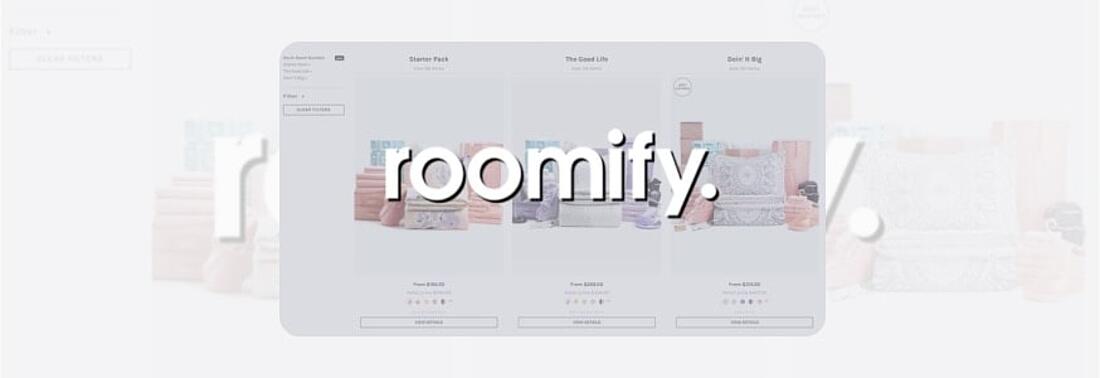
Strategy and Execution
Roomify addressed the need for affordable, stylish furnishings among college students and young adults by establishing a strong Amazon presence.
Competing with larger brands aimed at Millennials and Gen Z, Roomify ramped up its ad spend during peak seasons to boost visibility.
They adopted a two-pronged advertising approach, utilizing sponsored product ads to secure top search positions and enhancing product listings with engaging descriptions, high-quality images, and carefully selected keywords.
This strategic targeting made it easier for potential customers to discover Roomify’s offerings. Additionally, Roomify launched a tailored email drip campaign to encourage positive feedback and reviews, fully compliant with Amazon's communication policies.
Campaign Success → Marketing Numbers
This targeted Amazon marketing strategy led to a 273% revenue increase, with 80% of the growth coming from sponsored product ads.
By optimizing Amazon’s tools, Roomify positioned itself as a preferred choice for budget-conscious shoppers, making this an impactful Amazon marketing strategy case study.
13. RxBAR, Spotify, and Ice-T
→ Mobile Marketing Case Study
About the Partnership
RxBAR, known for its clean-label protein bars, collaborated with music streaming service Spotify and rapper/actor Ice-T to reach health-conscious consumers and increase brand awareness.
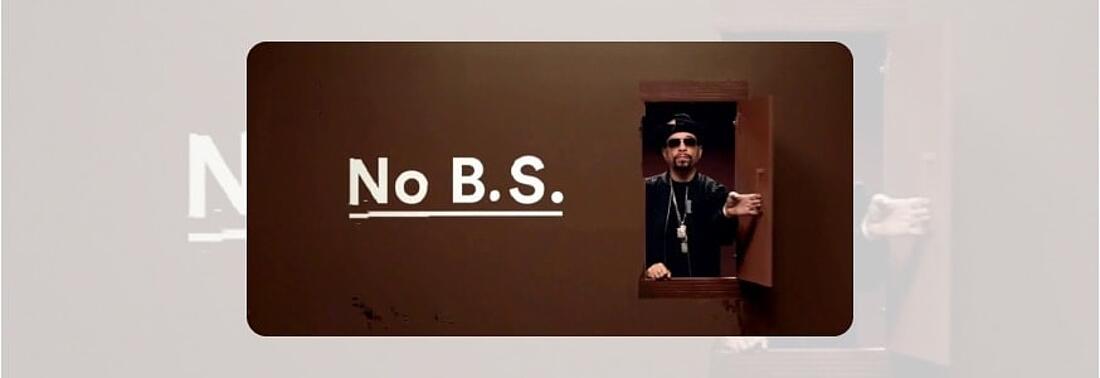
Strategy and Execution
Using a multi-channel mobile marketing strategy, RxBAR incorporated mobile and desktop overlays, audio ads, video takeovers, sponsored sessions, and homepage takeovers within Spotify’s app.
By tapping into Spotify’s audience insights, RxBAR delivered highly targeted ads that aligned with user interests and integrated the brand seamlessly into daily routines.
This data-driven, in-app marketing approach broadened RxBAR's reach and visibility in an engaging, relevant context.
Campaign Success → Marketing Numbers
The campaign achieved impressive outcomes, including a 243% lift in ad recall, a 42% increase in brand awareness, and a 52% rise in association with RxBAR's tagline.
This mobile marketing strategy case study underscores the power of strategic partnerships to drive brand engagement without needing a dedicated app.
14. NIVEA's "Men DEEP"
→ E-Sport Marketing Case Study
About the Company
NIVEA, a personal care brand owned by Beiersdorf, is renowned for their extensive range of products and commitment to delivering quality solutions for a diverse array of skin types.
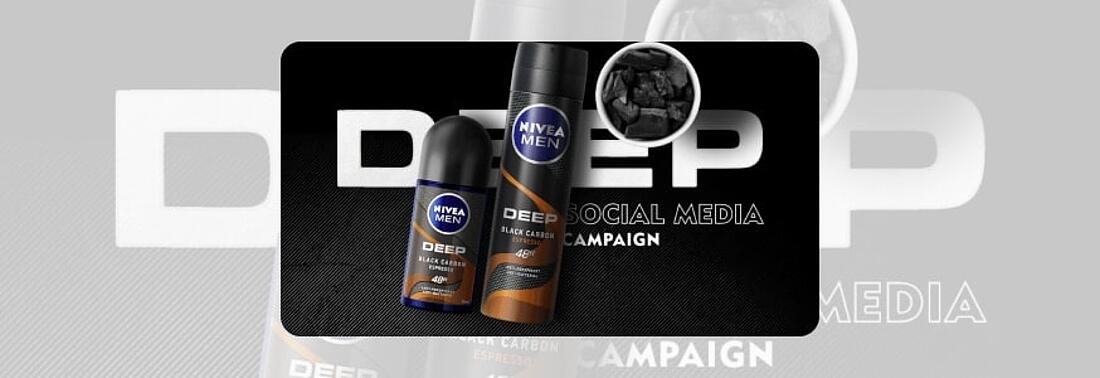
Strategy and Execution
NIVEA's campaign targeted its core demographic by leveraging eSports culture.
It began with an engaging marketing video that resonated with gamers, followed by virtual tournaments that encouraged audience participation.
The campaign culminated in a live event showcasing top teams, including professional gamers and popular Twitch streamers.
Recognizing that traditional notions of masculinity may not appeal to the target group, the campaign cleverly blended soccer with eSports, engaging the 70% of Swiss men aged 18 to 35 who identify as gamers.
This innovative approach elevated brand awareness and positioned NIVEA Men DEEP as a leading choice in men's grooming.
Campaign Success → Marketing Numbers
The campaign achieved a notable 19% increase in sales for the NIVEA MEN Deep product line, with over 4,300 views on Twitch and reaching more than 1 million users in Eastern Switzerland via social media.
Remarkably, it captured the attention of 90% of the target demographic, demonstrating the powerful impact of aligning brand messaging with consumer interests in a competitive market.
This e-sport marketing case study highlights how effectively engaging with the gaming community can drive brand success.
15. GumGum
→ Account-Based Marketing Case Study
About the Company
GumGum is a technology company that harnesses AI to improve digital advertising. Their AI-powered ad tech enables brands, publishers, and DSPs to deliver relevant ads to users at the right moment.
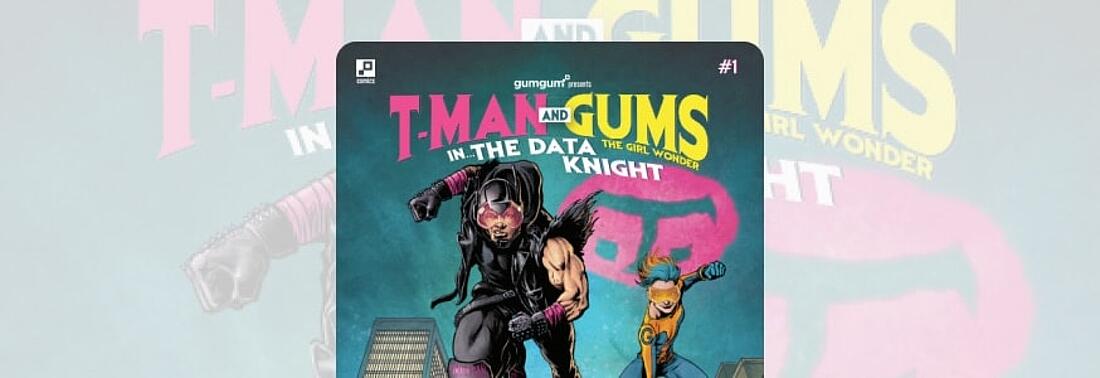
Strategy and Execution
GumGum set a high standard for personalized Account-Based Marketing (ABM) in its pursuit of T-Mobile as a client.
By leveraging T-Mobile CEO John Legere's vibrant online presence, GumGum gained valuable insights into his personality and interests, notably his passion for Batman, which inspired their creative strategy.
To craft a memorable pitch, GumGum commissioned a professionally illustrated comic book featuring John Legere as the Batman-inspired superhero "T-Man."
In this narrative, T-Man battles poor cell service in his city, assisted by his sidekick "Gums," symbolizing GumGum's cutting-edge image-recognition marketing technology.
This playful yet impactful approach not only resonated with Legere's interests but also showcased GumGum's creativity and ability to forge personal connections with potential clients.
Campaign Success → Marketing Numbers
The comic book campaign achieved remarkable success, resulting in the acquisition of T-Mobile as a client and generating significant media buzz.
John Legere shared the comic on Twitter, amplifying positive attention for GumGum and reinforcing their innovative approach to personalized marketing.
This account-based marketing case study illustrates how a unique and tailored strategy can leave lasting impressions and build strong client relationships.
16. LOCALIQ
→ Search Engine Marketing Case Study
About the Company
LOCALiQ is a dynamic digital marketing agency and local media company committed to empowering businesses through tailored marketing campaigns and strong community connections.
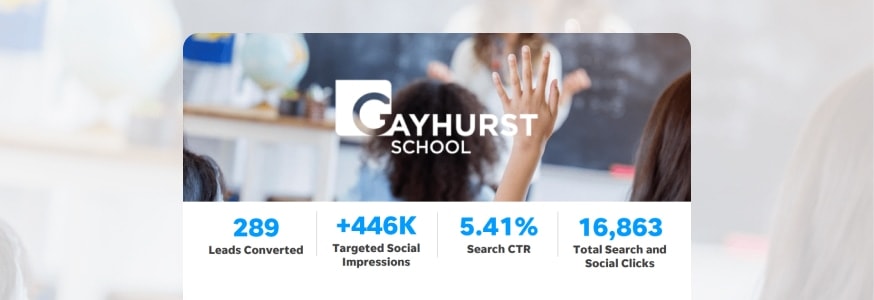
Strategy and Execution
LOCALiQ partnered with Gayhurst School to enhance their advertising strategy by integrating online marketing with existing print efforts.
Aiming to boost brand awareness and lead generation while showcasing its rich tradition and modern educational approach, LOCALiQ developed a comprehensive digital marketing strategy.
This included Search Engine Marketing (SEM) and targeted Facebook Lead and Retargeting campaigns, all customized to address the school’s regional focus.
A significant emphasis was placed on the Client Centre, allowing Gayhurst’s management team to nurture and monitor incoming leads through a tailored lead ad form.
Campaign Success → Marketing Numbers
LOCALiQ's campaigns for Gayhurst School achieved outstanding results within just 10 months, generating 446,269 impressions on Facebook, which exceeded industry standards with a click-through rate (CTR) of 1.62%.
The SEM strategic keyword plan also delivered impressive results, yielding 183,524 impressions and a remarkable CTR of 5.41%.
Overall, these efforts resulted in over 16,000 clicks to the school's website, translating into 289 new leads and marking Gayhurst School's most successful student intake in August 2022.
This search engine marketing case study exemplifies the effectiveness of a well-rounded digital strategy in achieving significant outcomes.
Share article
Get Started for Free
Gain World-Class Insights & Offer Innovative Privacy & Security

You might also like
Demographic Segmentation for Marketers: The Only Guide You Need 10 October 2024 - by Simon Coulthard
10 October 2024 - by Simon Coulthard
Interview: Orbit Media CEO Andy Crestodina 20 September 2024 - by TWIPLA Staff
20 September 2024 - by TWIPLA Staff
What Is A Data Breach? Definition, Types, Examples 11 September 2024 - by Simon Coulthard
11 September 2024 - by Simon Coulthard










